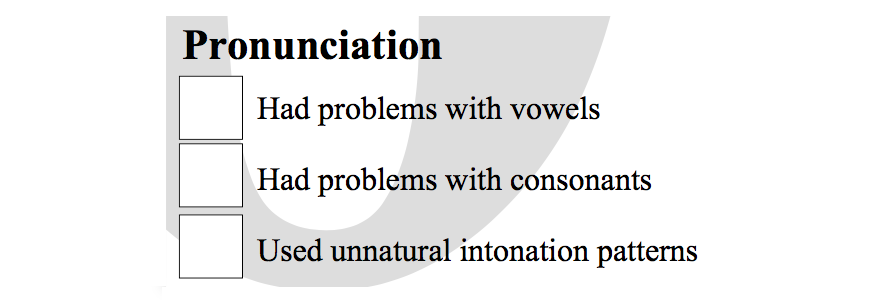
The pronunciation section is often a students' lowest score. However, due to the G.B.C.'s scoring system, improving a single point here will have a big overall effect.
Each section is weighted equally, but some sections have six or even nine criteria. On the other hand, the Pronunciation section only has three, so improving a single point means that one-third of the section is improved. That means the overall score is higher.

Notice that the sections are phrased negatively, "Had problems with vowels." Rather than include the negative, you can simply focus on the core content of each of the criteria.
Vowels
- Most intermediate and advanced students score a 2 in this section, meaning they can say most vowels correctly most of the time.
- Scoring 3 or above means you have mastery of the 20 vowel sounds in English and you are starting to have an accent from a country where English is the first language.
Consonants
- Many intermediate and even advanced students score a 1 in this section, meaning they have trouble with some key consonants.
- You can see personalized notes below your Vocabulary box, but for Asian speakers, they are typically: L/R, TH/Z, V/B or V/W.
- Scoring a 2 or above means you can consistently say most consonants correctly.
Intonation patterns
- Some intermediate and advanced students can score a 3 in this section, means they are stressing and unstressing consonants clearly.
- A score of 3 means you can use the schwa sound and stretch peak vowels. So for example, "economy" sounds like /iˈKAH-nə-mi/.
- The best way to improve intonation patterns is by using the Clear Speech textbook.
How do I improve?
From my personal experience teaching hundreds of students for the G.B.C. test since 2015, the Pronunciation score improves the slowest for most people.
Good students do improve though. They tend to think of pronunciation as a physical skill, like a sport. They also practice regularly and very specifically. For example, when I was first learning Japanese pronunciation, I focused on the smallest sound that I couldn't say, then learned how to say it, then repeated it until I could pronounce it without having to focus. I said ラ (ra) hundreds of times every day. It didn't take long to improve.
If you would like to work on speaking with correct word stress, use the Clear Speech textbook. Or, if you would like to learn how to say specific consonants and some vowels, use the Pronunciation In Use textbook.
As always, keep practicing. Your teachers can help you.